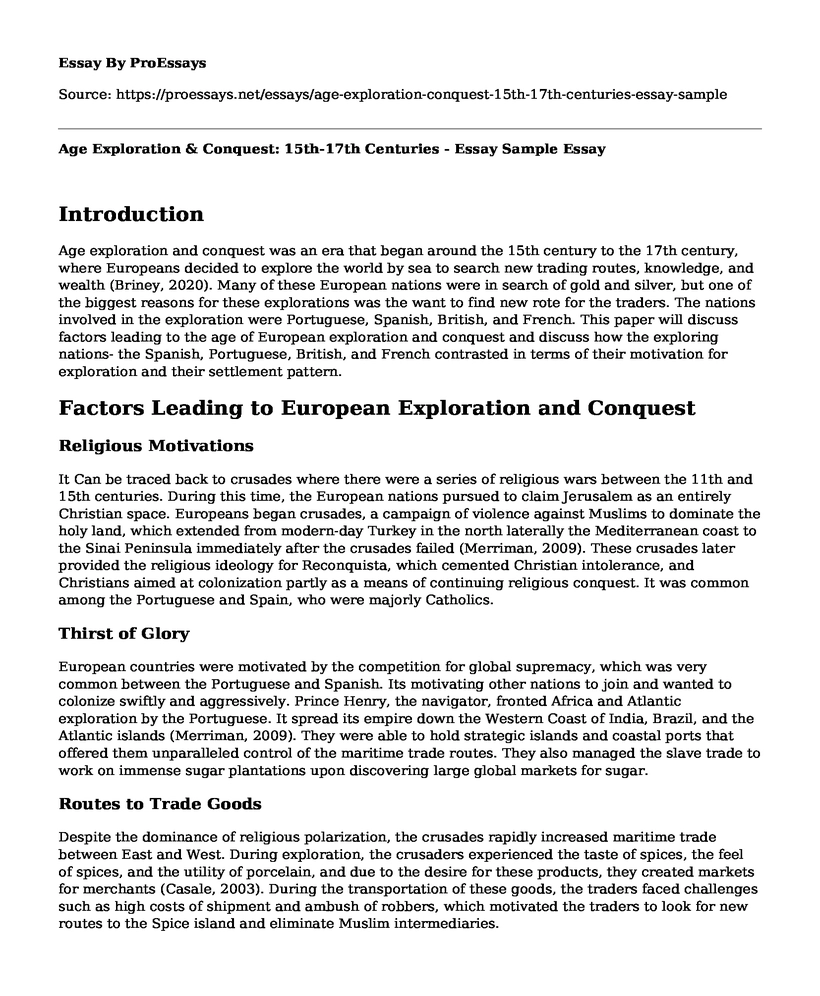Introduction
Age exploration and conquest was an era that began around the 15th century to the 17th century, where Europeans decided to explore the world by sea to search new trading routes, knowledge, and wealth (Briney, 2020). Many of these European nations were in search of gold and silver, but one of the biggest reasons for these explorations was the want to find new rote for the traders. The nations involved in the exploration were Portuguese, Spanish, British, and French. This paper will discuss factors leading to the age of European exploration and conquest and discuss how the exploring nations- the Spanish, Portuguese, British, and French contrasted in terms of their motivation for exploration and their settlement pattern.
Factors Leading to European Exploration and Conquest
Religious Motivations
It Can be traced back to crusades where there were a series of religious wars between the 11th and 15th centuries. During this time, the European nations pursued to claim Jerusalem as an entirely Christian space. Europeans began crusades, a campaign of violence against Muslims to dominate the holy land, which extended from modern-day Turkey in the north laterally the Mediterranean coast to the Sinai Peninsula immediately after the crusades failed (Merriman, 2009). These crusades later provided the religious ideology for Reconquista, which cemented Christian intolerance, and Christians aimed at colonization partly as a means of continuing religious conquest. It was common among the Portuguese and Spain, who were majorly Catholics.
Thirst of Glory
European countries were motivated by the competition for global supremacy, which was very common between the Portuguese and Spanish. Its motivating other nations to join and wanted to colonize swiftly and aggressively. Prince Henry, the navigator, fronted Africa and Atlantic exploration by the Portuguese. It spread its empire down the Western Coast of India, Brazil, and the Atlantic islands (Merriman, 2009). They were able to hold strategic islands and coastal ports that offered them unparalleled control of the maritime trade routes. They also managed the slave trade to work on immense sugar plantations upon discovering large global markets for sugar.
Routes to Trade Goods
Despite the dominance of religious polarization, the crusades rapidly increased maritime trade between East and West. During exploration, the crusaders experienced the taste of spices, the feel of spices, and the utility of porcelain, and due to the desire for these products, they created markets for merchants (Casale, 2003). During the transportation of these goods, the traders faced challenges such as high costs of shipment and ambush of robbers, which motivated the traders to look for new routes to the Spice island and eliminate Muslim intermediaries.
Comparison Between British Explorers versus French and Spanish Explorers
The motive of Spanish was to find Northwest pass, an age which was supposed to be a direct and effective route to the orient - the home of spices and silk, and looking for mineral wealth. (Casale, 2003). Also, the Portuguese aimed to establish trading posts in Asia and Africa and fin shipping routes for more straightforward trade with Asia for spices and textiles. On the other hand, the French wanted to claim new land to spread Christianity and get a new route by sea to the East through North America while the British were in search of exotic food, wealth, and mercantilism. British aim was to create colonies that would help them in the production of raw materials (Merriman, 2009).
British explorers were largely non-Catholics, while both Spanish and French were Catholics. Therefore, during exploration, the Spanish, French, and British were all Christians, and their main aim was to spread Christianity during prospecting. However, French and Spanish aimed at spreading Catholicism as compared to the British explorers (Merriman, 2009). It is worth noting that British colonies were developed economically compared to the French and Spanish. The English colonies' major economic activities were farming, fishing, trading, and majorly exporting tobacco and rice while the French traded in fur, which proved to be more lucrative (Merriman, 2009). On the other hand, Spanish was principally a trading economy. Additionally, British colonies were developed economically compared to French and Spanish (Merriman, 2009).
Conclusion
The age of exploration served as a stepping stone for many European nations, which improved both economically, socially, and politically to date. In contrast, most of the colonized nations have remained as developing countries. These effects of colonization persist.
References
Briney, A. (2020). A BRIEF History of Age of Exploration. Retrieved from https://www.thoughtco.com/age-of-exploration-1435006
Casale, G. L. (2003). Ottoman Age of Exploration: Spices, maps, and conquest insixteenth-century Indian Ocean.
Merriman, J. (2009). History of modern Europe: from Renaissance to the Present (Vol. 1). WW Norton & Company.
Cite this page
Age Exploration & Conquest: 15th-17th Centuries - Essay Sample. (2023, May 15). Retrieved from https://proessays.net/essays/age-exploration-conquest-15th-17th-centuries-essay-sample
If you are the original author of this essay and no longer wish to have it published on the ProEssays website, please click below to request its removal:
- Slavery and What It Has to Do With the Foundation of America
- The Impact and Opportunities of the Forth Industrial Revolution on Developing Nations: A Case Study of South Africa
- Should the US Have Joined World War 1 - Essay Sample
- Essay Sample on US Military Intervention in Iraq
- Richard Ramirez Crimes Case Study Paper Example
- Essay Example on Jean-Paul Sartre: The Best Philosopher of His Time and Beyond
- Paper Example on Surf Wax







